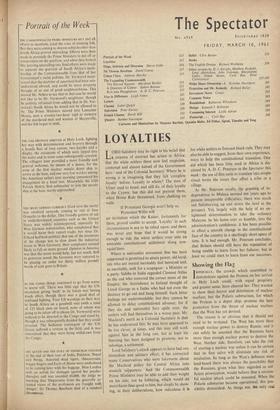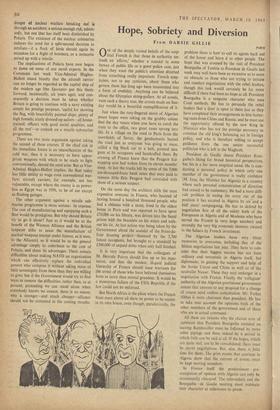Showing the Flag
IRONICALLY, the crowds which assembled to demonstrate against the Proteus on her arrival in Holy Loch could, with equal propriety and greater sense, have cheered her. They wanted to show their horror and detestation of nuclear warfare; but the Polaris submarines, for which the Proteus is a depot ship, promise the best protection from the threat of nuclear warfare that the West has yet devised.
The reason is so obvious that it should not need to be re-stated. The West has more than enough nuclear power to destroy Russia; and it can safely be assumed that the Russians have more than enough nuclear power to destroy the West. Neither side, therefore, can take the risk of starting a nuclear war unless it can be certain that its first salvo will eliminate any risk of retaliation. So long as the West's defences were land-based there was always the possibility that the Russians, given what they regarded as suf- ficient provocation, would believe that a success- ful nuclear attack could be mounted. When the Polaris submarine became operational, this pos- sibility diminished. As things are, the only real danger of nuclear warfare breaking out is through an accident; a serious enough risk, admit- tedly, but one that has itself been diminished by Polaris. The existence of the nuclear submarine reduces the need for a split-second decision to retaliate—if a flock of birds should again be mistaken for a flight of bombers, or a meteorite mixed up with a missile.
The implications of Polaris have now begun to dawn on some of our naval experts. In the Commons last week Vice-Admiral Hughes- Hallett stated bluntly that the aircraft carrier can no longer be regarded as the capital ship of the modern age (the Spectator put this thesis forward, incidentally, six years ago); and con- sequently a decision must be taken whether Britain is going to continue with a navy existing simply for prestige purposes, 'useful for showing the flag, with beautifully painted ships; plenty of high funnels; nicely dressed-up sailors—all house- trained; officers with. good social qualities, and all the rest'—or embark on a missile submarine programme.
There are two main arguments against taking the second of these courses. If the chief risk in the immediate future is an intensification of the cold war, then it is necessary to have appro- priate weapons with which to be ready to fight conventionally, should the need arise. But as Vice- Admiral Hughes-Hallett implies, the fleet today has little ability to wage even conventional war- fare; aircraft carriers, for example, are too vulnerable, except where the enemy is as power- less as Egypt was in 1956, to be of use except as floating garages.
The other argument against a missile sub- marine programme is more serious: its expense. The cost of manufacturing and equipping such a fleet would be prodigious. But why should Britain try to go it alone? Just as it would be to the benefit of the Western Alliance and the British taxpayer alike to cease the manufacture of nuclear weapons (except under licence, as it were, to the Alliance), so it would be to the general advantage simply to contribute to the cost of Polaris, and share its advantages. There remain difficulties about making NATO an organisation which can effectively replace the individual powers who compose it without taking more of their sovereignty from them than they are willing to give; but if the Government would try to find ways to remove the difficulties, rather than, as at present, pretending we can stand alone when everybody knows we cannot, there is no reason why a stronger—and much cheaper—alliance should not be cemented in the coming months.







































 Previous page
Previous page